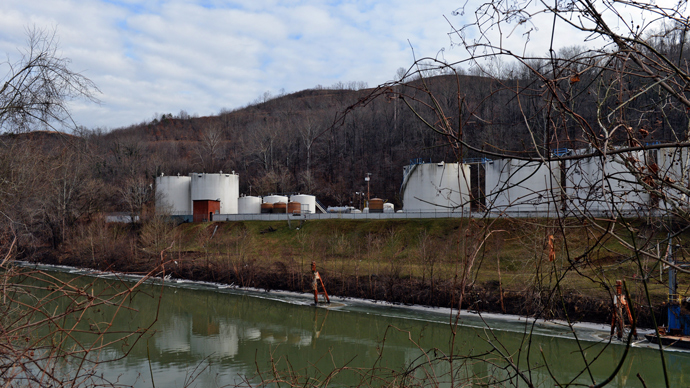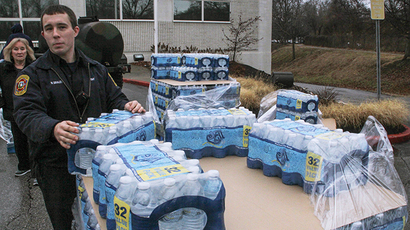Single cinder block was used to contain toxic chemical prior to mass W. Virginia spill

State inspectors found that the company involved in a major chemical spill in West Virginia had set up a simple cinder block and one 50-pound bag of a safety absorbent powder, according to the Charleston Gazette.
On Thursday officials with the state’s Department of Environmental Protection (DEP) responded to complaints of a smell coming from the area of Freedom Industries facilities, noting the rudimentary measures taken to block the flow of “Crude MCHM” leaving a compromised containment tank.
"This was a Band-Aid approach," DEP air quality inspector Mike Kolb said, according to the Charleston Gazette. "It was apparent that this was not an event that had just happened." State and local officials said Freedom Industries' containment dike was full of cracks and holes.
"The facility did not give any real attention to containment," said another DEP official on site Thursday. As soon as DEP officials realized the leak was tainting water supply, they notified the agency’s emergency response, water pollution and hazardous materials crews.
The toxic chemical leaking from Freedom Industries’ tank farm upstream from a drinking water intake for hundreds of thousands of West Virginians was never assigned an emergency strategy by local or state entities since it was left off a federal law’s requirements.
Officials say state and local planners did not have an emergency-response plan in case of a spill of “Crude MCHM,” the coal-processing substance that was first noticed leaking from Freedom Industries’ storage facility late Thursday morning along the Elk River just north of Charleston.
The absence of strategy for such an accident may be explained by a federal law that does not require one for “Crude MCHM,” also known as 4-methylcyclohexanemethanol.
Despite consistent warnings of a possible incident near the West Virginia American Water, which supplies water to around 300,000 people in the Kanawha River Valley, local emergency officials with the Kanawha-Putnam Emergency Planning Committee did not have a plan. Since 2008, local planners have known Freedom Industries stored “Crude MCHM” at the nearby Elk River facility.
Those disclosures were filed to the state Department of Military Affairs and Public Safety under the federal Emergency Response and Community Right to Know Act. The 1980s law was designed to give state and local emergency responders adequate insight into how to handle certain chemical leaks or spills.
A spokesman for the state public safety department said that while the state reviews the disclosures for changes in chemical holdings, it does not craft site-specific emergency plans. Local entities are usually in control of safety reviews, Lawrence Messina told the Gazette.
Messina pointed out that “Crude MCHM” is not listed under federal rules as an "extremely hazardous material" pursuant to the emergency planning law. If it was on that list, Messina said the company is required to supply the state and local governments with an accident strategy.
"If something is classified as an extremely hazardous material, there is a different level of scrutiny," Messina said.
In addition, Messina said state officials reviewing the federal law disclosures would not have necessarily known the facility was so close upstream from a drinking water intake.
Gov. Earl Ray Tomblin says DEP is working on pertinent legislation addressing incidents like Thursday’s leak. The Charleston Gazette reported that DEP has not inspected the Freedom Industries site since 1991, when it was owned by Pennzoil.
DEP Secretary Randy Huffman explained that the facility was not regularly inspected because the company did not manufacture chemicals on site, and only stored and shipped products. Yet DEP did have authority to inspect the facility based on a “general permit” program, which also technically required Freedom to have an accident-preparedness plan to immediately report potentially dangerous spills to the state.
US Attorney Booth Goodwin said Monday that his office would certainly investigate the company’s handling of chemical protocols.
"As the immediate water crisis begins to ease and West Virginians regain access to drinkable water, I want to make three things clear," Goodwin said in a statement.
"One, my office will continue working as quickly as possible to find out exactly what happened here, including the complete timeline of the release and what was done -- or not done -- before and after it," he said. "Two, if our investigation reveals that federal criminal laws were violated, we will move rapidly to hold the wrongdoers accountable. And three, companies whose facilities could affect the public water supply should be on notice: If you break federal environmental laws, you will be prosecuted. Our drinking water is not something you can take chances with, and this mess can never be allowed to happen again."
On Sunday, the Charleston Gazette reported that one of Freedom Industries’ well-connected executives, Carl Lemley Kennedy II, has two prior felonies on his record. In 2005, he was charged with tax evasion and failure to pay the government Freedom employees’ tax withholdings while he was the company’s accountant from 2000 to 2003. The other felony came in 1987, for selling cocaine.
The Gazette also revealed that Freedom’s Elk River facility nearly shut down in 2009 because “sand, silt and mud had built up in the river, making it difficult for barges to travel the 2.5 miles from the company's river terminal to the Elk's confluence with the Kanawha.” Luckily for the company’s executives, who have only spoken publicly or offered statement once since Thursday, the river was dredged that year by the US Army Corps of Engineers based on an influx of $400,000 from the federal stimulus package.
In a letter to the U.S. Environmental Protection Agency and the Centers for Disease Control, Sen. Jay Rockefeller wrote Monday pressing the federal entities on their involvement in the spill and its aftermath. He also urged the agencies to monitor "the long-term health effects" of the contaminated water supply.
Rockefeller wrote that many of his affected constituents “fear ongoing leaching from contaminated soil, river banks and the holding tanks which could result in further contamination of the water supply at a time when the water treatment facility may have compromised filters and taxed processing systems."
The Senator added that "at the time of the spill, neither science nor industry had existing protocols for either testing or safe levels of exposure to this chemical."














